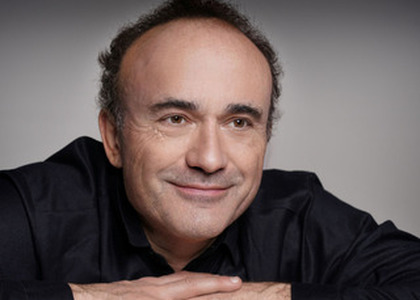> [Archived] Interviews

Interview with Frédéric Chaslin, conductor and composer
Mahler once stated in a letter: "Composition is like playing with building blocks," a perspective which seems particularly applicable to his first symphony. What is your vision regarding this work?
I wrote a novel about Gustav Mahler five years ago, in which I portrayed the character, Mahler,in such a way that I allowed him to speak, since I extensively studied his biography. I wasn't aware of this specific quote, but in the book, I managed to depicthim explaining how he composes music - like a child finding chords he likes through improvisation, then more chords related to the first ones, gradually building from them some sort of room, from which another room emerges. From these, a castle is built, then an entire world. It's somewhat the same concept. That's what a composer does. His process is akin to that of a child finding some notes he feels are his own, then more notes, which become a melody, and gradually shaping his own world. It's crucial that the constructed universe truly belongs to you, uniquely yours.
You refer to Mahler as your favorite composer, having also written the novel about him and his life… What draws you to his artistic personality?
For me, his music is the richest, in the sense that it's filled with things other composers have never woven into their works. It's based on academic elements and forms - melodies, counterpoint, etc. which are always surprising, unexpected. It's like a play with many characters. Mahler said, "A symphony must be like the world. It must contain everything." There's no work where he merely discusses a theme in an academic manner (perhaps excluding Symphony No. 8, where the theme of the first part is taken from a liturgy, where it almost becomes Bach). His music is full of absolutely everything, without the need for external logic; it's all about an internal meaning - his dream world. As a child, Mahler dreamt a lot and very vividly, almost in a meditative way. As he grew up, he began composing music as if building the world of his dreams - many characters, many surprises, many theatrical, dramatic situations, etc. There's no other composer who wrote like this - that's why I admire him because he's unique. We could say it's about a child's freedom, but controlled by an adult, superior mind.
How does the pairing of Mahler's Symphony No. 1 and Grieg's Piano Concerto, one of the most beloved works in this genre, function in this program?
I no longer believe in the perfect alignment of a musical program, especially when it comes to Mahler's works. During the composer's concerts, as can be seen in the preserved posters, everything was included - for example, a soprano aria, then the overture from "The Mastersingers of Nuremberg," followed by a piece by Schumann, something by Debussy… there was no logic, no organization. In our times, we feel the need to match musical programs, but in his time, it was more like a buffet, a Swedish buffet.
You are a conductor and composer. How do these two activities support each other, from your perspective?
For me, the two are absolutely complementary. However, if I had to give up one of the activities, it would be conducting. Composition greatly assists me in conducting, and conducting is useful to me when composing. It provides me with many elements that I can use in my music, especially regarding orchestration. It's important to be able to hear how an orchestra sounds live. After 30 years of conducting, I know, I can mentally construct orchestral combinations, instrumental even. Composition helps me in conducting because sometimes I find a small mistake or something that could be written better, even in the works of great composers like Mahler. Sometimes I think that if I were to change a detail, a certain passage could sound better. Moreover, Mahler, towards the end of his life, told his assistant Bruno Walter - if you find a better version regarding my scores, please follow it, implement it, because I never consider my works finished. He considered all his symphonies "incomplete."
How do you feel about returning to Bucharest to work with the National Radio Orchestra?
This is my fifth concert with them. I haven't performed Mahler with the Radio Orchestra before, but I'm very excited about the feeling I have. I was the director of the Jerusalem Symphony Orchestra for 25 years, which includes many Romanian musicians. I've always relied on them to bring fire, passion to the music. The same happens when I conduct in France. Romanians have this special connection with music, based on fire, passion, temperament; they love music and have a soul for it. Which is not something many folks have.
Translated by Marian-Cătălin Niculăescu,
University of Bucharest, Faculty of Foreign Languages and Literatures, MTTLC, year I
Corrected by Silvia Petrescu














